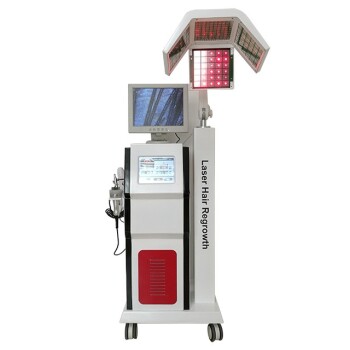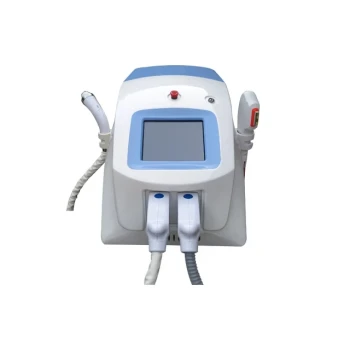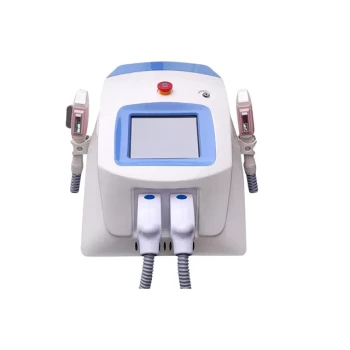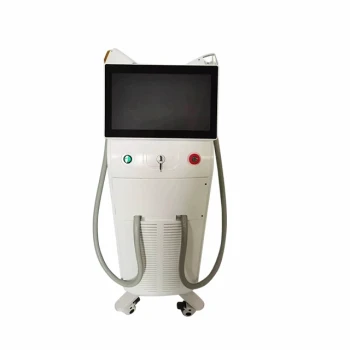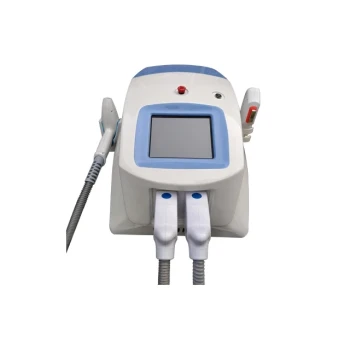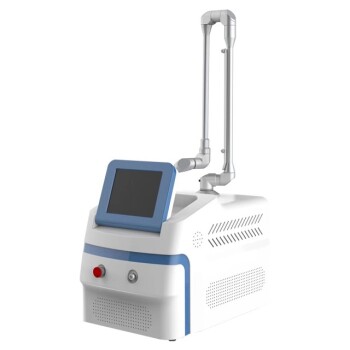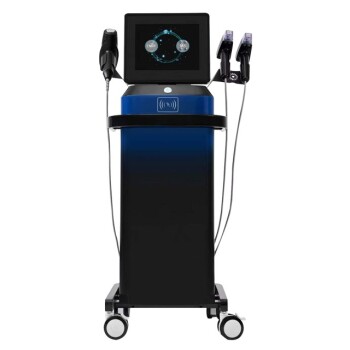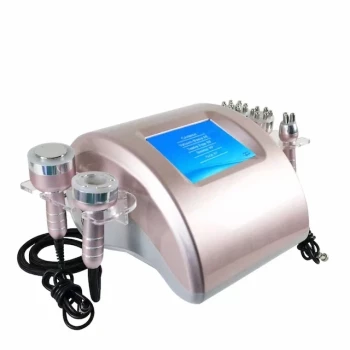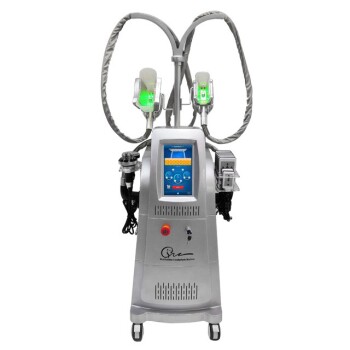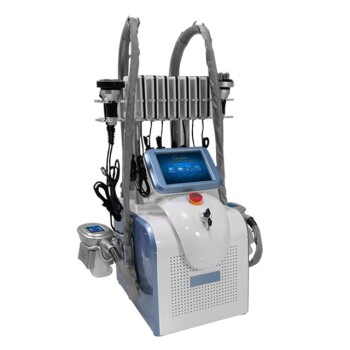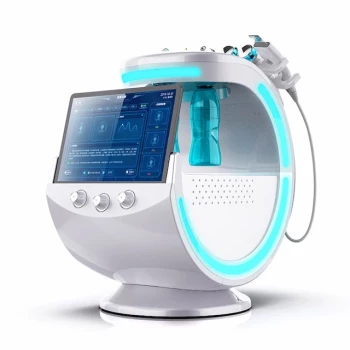Determining if hair regrowth treatment is a worthwhile investment requires a shift in perspective. It's less about whether treatments "work" in a general sense and more about whether a specific treatment is appropriate for the unique cause of your hair loss. The effectiveness is not universal; it is highly conditional on a correct diagnosis, patient consistency, and realistic expectations.
The value of a hair regrowth treatment is not found in the product or procedure itself, but in the precision of the diagnosis that precedes it. A treatment is only "worth it" when it directly counteracts the specific biological reason you are losing hair.
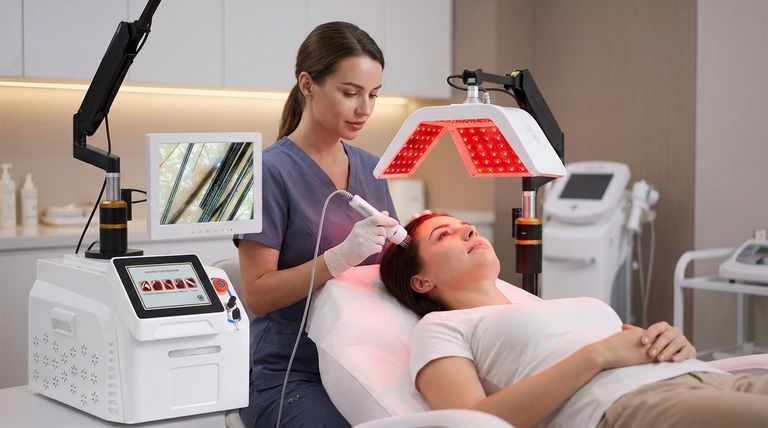
The First Principle: Why Are You Losing Hair?
Before evaluating any solution, you must understand the problem. Hair loss is a symptom, not a singular disease. Applying a treatment without knowing the cause is like trying to unlock a door with a random key—the chances of success are minimal.
The Critical Role of Diagnosis
The single most common reason for treatment failure is a mismatch between the treatment's mechanism and the patient's condition. A consultation with a dermatologist to identify the specific type of hair loss is the most crucial first step.
Common Culprit #1: Androgenetic Alopecia
Also known as male or female pattern baldness, this is the most frequent cause of hair loss. It is a genetic condition where hair follicles become sensitive to a hormone called dihydrotestosterone (DHT), causing them to shrink and eventually stop producing hair.
Common Culprit #2: Telogen Effluvium
This condition involves widespread, temporary hair shedding. It is typically triggered by a significant physical or emotional stressor, such as a major illness, surgery, nutritional deficiency, or intense personal stress. The hair growth cycle is disrupted, pushing many hairs into the shedding phase at once.
Common Culprit #3: Alopecia Areata
This is an autoimmune condition where the body's own immune system mistakenly attacks healthy hair follicles. This leads to patchy hair loss that can sometimes progress to total scalp or body hair loss.
Matching the Treatment to the Cause
Once a cause is identified, the "worth" of a treatment becomes much clearer. Each effective treatment is designed to intervene at a specific point in the hair loss process.
For Androgenetic Alopecia: Finasteride & Minoxidil
These are the two most common and FDA-approved treatments for pattern baldness. Finasteride works by reducing DHT levels in the body, directly addressing the hormonal cause. Minoxidil is a topical solution that is thought to increase blood flow and prolong the hair's growth phase. They are effective for this condition but largely ineffective for others.
For Telogen Effluvium: Addressing the Trigger
Topical treatments typically have little effect on telogen effluvium. The "treatment" here involves identifying and resolving the underlying stressor. This could mean correcting a nutritional deficiency, managing stress, or simply waiting for the body to recover after an illness. The hair usually regrows on its own once the trigger is removed.
For Alopecia Areata: Managing the Immune Response
Treatment for this autoimmune condition is complex and focuses on suppressing the local immune reaction. This often involves corticosteroid injections or other immunomodulatory therapies prescribed by a dermatologist. Standard over-the-counter treatments are not effective.
Understanding the Trade-offs and Realities
Even with a correct diagnosis, treatment is a significant commitment with inherent limitations. Objectivity is your best tool for evaluating whether it is worth it for you.
The Commitment: Treatment Is a Marathon
Most effective treatments, particularly for androgenetic alopecia, require continuous, long-term use to maintain results. If you stop using minoxidil or finasteride, the hair loss you prevented will typically resume within several months.
The Cost Factor: A Financial and Personal Investment
Treatments carry an ongoing financial cost. You must weigh the monthly or annual expense against your budget and the personal value you place on maintaining or regrowing your hair.
The Efficacy Spectrum: Not a Universal Cure
Success looks different for everyone. For many, a "win" is significantly slowing the rate of hair loss, not achieving full regrowth. Furthermore, treatments work best on follicles that are dormant, not those that have been inactive for years and have died off.
Making an Informed Decision for Your Situation
Your personal goals and the specific nature of your hair loss are the only factors that matter. Use this framework to decide your next step.
- If your primary focus is stopping loss from pattern baldness: A consultation with a dermatologist to discuss FDA-approved options like finasteride and minoxidil is your most direct and evidence-based path.
- If you are experiencing sudden, widespread shedding: Focus on identifying a potential trigger (stress, diet, recent illness) with a medical professional before investing in topical treatments.
- If you have extensive baldness and desire cosmetic restoration: A hair transplant, which moves healthy follicles to thinning areas, may be the most impactful option, though it is a significant surgical and financial decision.
Ultimately, the worth of any treatment is measured by its precise alignment with a correct diagnosis and your personal goals.
Summary Table:
| Hair Loss Cause | Primary Treatment Approach | Key Considerations |
|---|---|---|
| Androgenetic Alopecia | Finasteride, Minoxidil | Long-term commitment required; stops loss, not a universal cure. |
| Telogen Effluvium | Address underlying stressor/illness | Hair typically regrows after trigger is resolved; topicals ineffective. |
| Alopecia Areata | Corticosteroid injections, immunomodulators | Requires dermatologist diagnosis; OTC treatments not effective. |
Achieve lasting results with professional-grade solutions. The right medical aesthetic equipment is crucial for delivering effective, safe treatments. BELIS specializes in professional medical aesthetic equipment for hair regrowth and skin rejuvenation, serving medical aesthetics clinics and premium beauty salons. Our advanced technology ensures precise, reliable performance for your clients' needs. Ready to enhance your practice's capabilities? Contact our experts today to discover the ideal equipment for your business.
Visual Guide
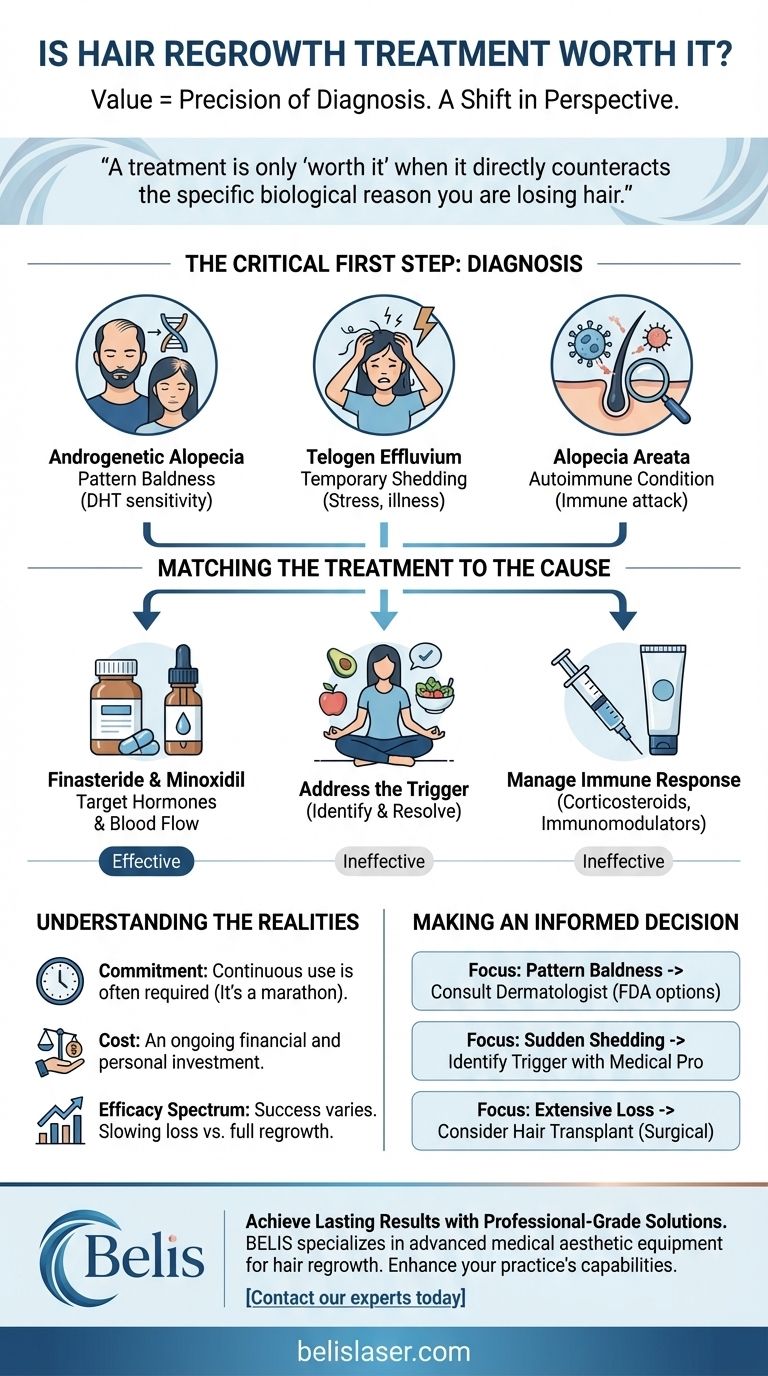
Related Products
- Multifunctional Laser Hair Growth Machine Device for Hair Growth
- Multifunctional Laser Hair Growth Machine Device for Hair Growth
- Hydrafacial Machine Facial Clean Face and Skin Care Machine
- Diode Laser SHR Trilaser Hair Removal Machine for Clinic Use
- Trilaser Diode Hair Removal Machine for Beauty Clinic Use
People Also Ask
- What are the typical steps for using a laser cap to promote hair growth? A Professional Guide to Hair Restoration
- What is the proposed mechanism by which low-level laser treatment (LLLT) stimulates hair growth? Science of Hair Regrowth
- How effective is LLLT for hair? Clinically Proven to Boost Hair Growth by 35%
- What are the specific benefits of laser hair therapy treatment? Boost Scalp Health and Restore Hair Density
- What is laser hair therapy and how does it stimulate hair growth? A Deep Dive into LLLT and Scalp Rejuvenation

